"Without You" is a song written by Pete Ham and Tom Evans of British rock group Badfinger, and first released on their 1970 album No Dice. The power ballad has been recorded by over 180 artists, and versions released as singles by Harry Nilsson (1971), T. G. Sheppard (1983) and Mariah Carey (1994) became international best-sellers. The Nilsson version was included in 2021's Rolling Stone's 500 Greatest Songs of All Time. Paul McCartney once described it as "the killer song of all time".

"Let It Be" is a song by the English rock band the Beatles, released on 6 March 1970 as a single, and as the title track of their album Let It Be. It was written and sung by Paul McCartney, and credited to the Lennon–McCartney partnership. The single version of the song, produced by George Martin, features a softer guitar solo and the orchestral section mixed low, compared with the album version, produced by Phil Spector, featuring a more aggressive guitar solo and the orchestral sections mixed higher.

"Can't Help Falling in Love" is a song recorded by American singer Elvis Presley for the album Blue Hawaii (1961). It was written by Hugo Peretti, Luigi Creatore, and George David Weiss and published by Gladys Music, Inc. The melody is based on "Plaisir d'amour", a popular French love song composed in 1784 by Jean-Paul-Égide Martini. The song was initially written from the perspective of a woman as "Can't Help Falling in Love with Him", which explains the first and third line ending on "in" and "sin" rather than words rhyming with "you".

"Cat's in the Cradle" is a 1974 folk rock song by Harry Chapin from the album Verities & Balderdash. The single topped the US Billboard Hot 100 in December 1974. As Chapin's only number-one song, it became the best known of his work and a staple for folk rock music. Chapin's recording of the song was nominated for the 1975 Grammy Award for Best Male Pop Vocal Performance and was inducted into the Grammy Hall of Fame in 2011.
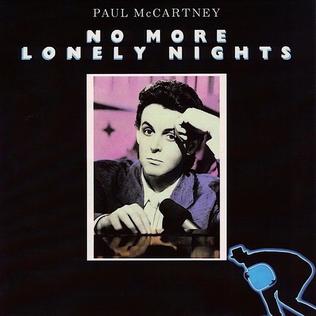
"No More Lonely Nights" is a song written and performed by Paul McCartney, first released on 24 September 1984 on the album Give My Regards to Broad Street
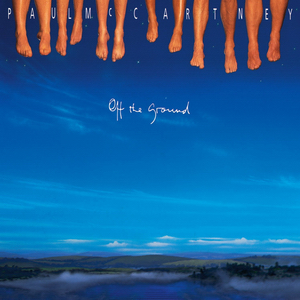
Off the Ground is the ninth solo studio album by Paul McCartney, released on 1 February 1993. As his first studio album of the 1990s, it is also the follow-up to the well received Flowers in the Dirt (1989).
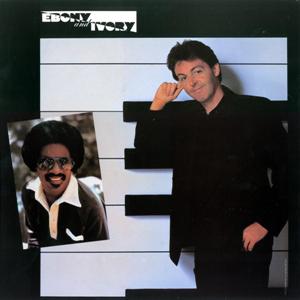
"Ebony and Ivory" is a song that was released in 1982 as a single by Paul McCartney featuring Stevie Wonder. It was issued on 29 March that year as the lead single from McCartney's third solo album, Tug of War (1982). Written by McCartney, the song aligns the black and white keys of a piano keyboard with the theme of racial harmony. The single reached number one on both the UK and the US charts and was among the top-selling singles of 1982 in the US. During the apartheid era, the South African Broadcasting Corporation banned the song after Wonder dedicated his 1984 Academy Award for Best Original Song to Nelson Mandela.

American singer Michael Jackson released 67 singles as a lead artist, and 10 as a featured artist. One of the best-selling artists of all time, his album and single sales as of 2013 stood at 400 million. In the United States, Jackson amassed 13 Billboard Hot 100 number-one singles and was the first artist to have a top-ten single in the Billboard Hot 100 in five different decades. In 2012, Jackson was ranked the fifth best selling singles artist in the United Kingdom with 15.3 million singles sold.
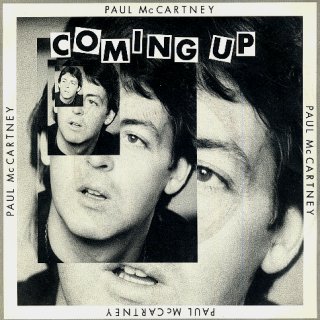
"Coming Up" is a song written and performed by the English rock musician Paul McCartney, released as the opening track on his second solo studio album McCartney II (1980). Like other songs on the album, the song has a synthesised sound, featuring sped-up vocals created by using a vari-speed tape machine. McCartney played all instruments.

"Stars on 45" is a song medley issued in January 1981 by Dutch studio group Stars on 45. In some countries, including the UK, Ireland, and New Zealand, the band was credited as 'Starsound' and only the medley itself was named "Stars on 45".
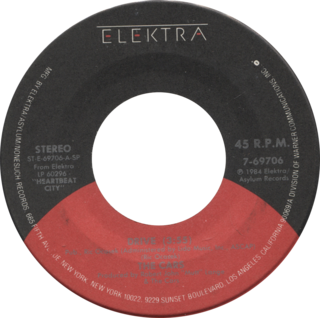
"Drive" is a song by American rock band The Cars from their fifth studio album, Heartbeat City (1984). It was released on July 23, 1984, as the album's third single. Written by Ric Ocasek, the track was sung by bassist Benjamin Orr and produced by Robert John "Mutt" Lange with the band. Upon its release, "Drive" became the Cars' highest-charting single in most territories. In the United States, it peaked at number three on the Billboard Hot 100 and topped the Adult Contemporary chart. It reached number five in the United Kingdom, number four in West Germany, number six in Canada and number three in Ireland.

"Mull of Kintyre" is a song by the British-American rock band Wings. It was written by Paul McCartney and Denny Laine in tribute to the Kintyre peninsula in Argyll and Bute in the south-west of Scotland and its headland, the Mull of Kintyre, where McCartney has owned High Park Farm since 1966.

"Silly Love Songs" is a song by the British–American rock band Wings that was written by Paul and Linda McCartney. The song first appeared in March 1976 on the album Wings at the Speed of Sound, then it was released as a single backed with "Cook of the House" on 1 April in the US, and 30 April in the UK. The song, which features disco overtones, was written in response to music critics accusing McCartney of predominantly writing "silly love songs" and "sentimental slush"; however, McCartney has since clarified that the song was actually directed to John Lennon who accused him of writing such songs.
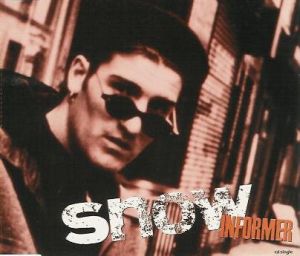
"Informer" is a song by Canadian reggae musician Snow, released in August 1992 as the first single from his debut album, 12 Inches of Snow (1993). The song is well known for the line "a licky boom boom down" and for Snow's fast toasting and often unintelligible lyrics.

"Live and Let Die" is the theme song of the 1973 James Bond film of the same name, performed by the British–American rock band Wings. Written by English musician Paul McCartney and his wife Linda McCartney, it reunited McCartney with former Beatles producer George Martin, who produced the song and arranged the orchestra. McCartney was contacted to write the song by the film's producers Harry Saltzman and Albert R. Broccoli before the screenplay was finished. Wings recorded "Live and Let Die" during the sessions for Red Rose Speedway in October 1972 at AIR Studios. It was also the first rock song to open a Bond film. Another version by B. J. Arnau also appears in the film.
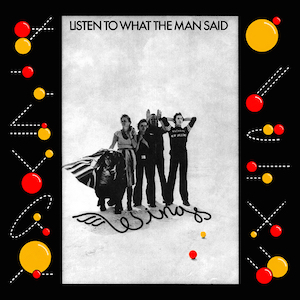
"Listen to What the Man Said" is a hit single from Wings' 1975 album Venus and Mars. The song featured new member Joe English on drums, with guest musicians Dave Mason on guitar and Tom Scott on soprano saxophone. It was a number 1 single on the Billboard Hot 100 in the US the week of July 19, 1975 and reached number 1 in Canada on the RPM National Top Singles Chart. It also reached number 6 in the UK, and reached the top ten in Norway and New Zealand and the top twenty in the Netherlands. The single was certified Gold by the Recording Industry Association of America for sales of over one million copies.
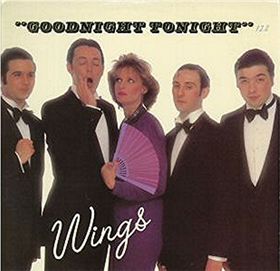
"Goodnight Tonight" is a song by the British–American rock band Wings. Written and produced by Paul McCartney, it was released as a non-album single on 23 March 1979 by Parlophone in the UK and Columbia Records in the US. It was recorded during the sessions for the band's 1979 album Back to the Egg and is notable for its disco-inflected sound and spirited flamenco guitar break.

"The World Tonight" is a song by Paul McCartney and is the second track on his 1997 album Flaming Pie. This song and Young Boy were featured in the 1997 movie Fathers' Day.

"Young Boy" is a song by English musician Paul McCartney, included as the fifth track on his 10th solo studio album, Flaming Pie (1997). McCartney reportedly started working on the song in August 1994. The initial tracks were recorded in February 1995 at Steve Miller's studio in Sun Valley, Idaho, and were completed in May at McCartney's home studio. This song and The World Tonight were featured in the 1997 movie Fathers' Day.

"C'Mon People" is a single from English singer-songwriter Paul McCartney's 1993 album, Off the Ground. The song reached number 41 on the UK Singles Chart. The video for the single was directed by ex-10cc member Kevin Godley and shows McCartney at the piano singing the song while workmen speedily deconstruct it and re-build it around him.



















